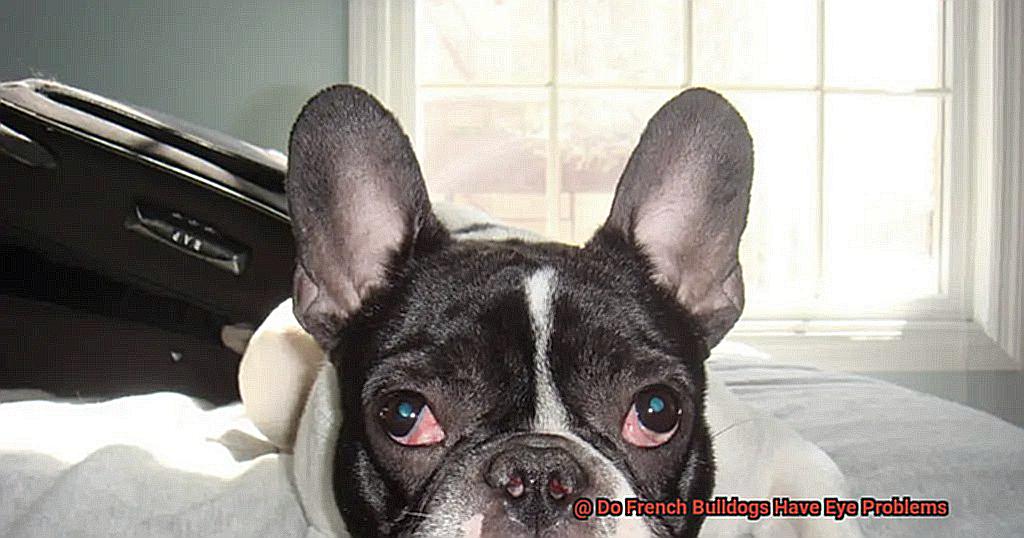Do French Bulldogs Have Eye Problems?
French Bulldogs, those adorable little bundles of joy, are known for their unique looks and lovable personalities.
But did you know that these cuties often face some serious eye problems? Yep, it’s true.
From pesky corneal ulcers to the dreaded cherry eye and wonky eyelids, French Bulldogs have a higher risk of ocular issues compared to other breeds. In this blog post, we’re going to dive deep into the world of French Bulldog eye problems.
Whether you’re already a proud owner or just thinking about getting one of these delightful pups, buckle up because we’re about to shed some light on this crucial aspect of their well-being.
Do French Bulldogs have eye problems
Contents
- 1 Do French Bulldogs have eye problems
- 2 What Are the Most Common Eye Issues in French Bulldogs?
- 3 What Is Cherry Eye in French Bulldogs?
- 4 How Is Entropion Treated in French Bulldogs?
- 5 What Causes Dry Eye in French Bulldogs?
- 6 Symptoms of Corneal Ulcers in French Bulldogs
- 7 Treatment Options for Corneal Ulcers in French Bulldogs
- 8 Tips for Monitoring Your French Bulldog’s Eyes
- 9 How to Find a Veterinary Ophthalmologist for Your French Bulldog
- 10 Conclusion
French Bulldogs are beloved for their unique appearance and affectionate nature. However, as a responsible owner, it’s crucial to be aware of the eye health issues that this breed is prone to. In this article, we’ll discuss the common eye problems that French Bulldogs may experience and provide insights on how to prevent and manage these issues.
Cherry Eye:
One of the most well-known eye problems in French Bulldogs is cherry eye. This condition occurs when the gland in the third eyelid becomes inflamed and protrudes, resembling a red cherry. While it may look alarming, it’s usually not painful for the dog. However, surgical intervention is often required to correct cherry eye and prevent discomfort or further complications.
Entropion:
Entropion is another common eye issue in French Bulldogs. This condition involves the inward rolling of the eyelids, causing the eyelashes to rub against the cornea. Entropion can lead to corneal ulcers, excessive tearing, and discomfort for the dog. Surgical correction is necessary to prevent long-term damage to the eyes.
Dry Eye Syndrome (KCS):
French Bulldogs are susceptible to dry eye syndrome or keratoconjunctivitis sicca (KCS). This condition occurs when there is insufficient tear production, resulting in dryness and inflammation of the eyes. Treatment often involves artificial tears and medications to stimulate tear production.
Cataracts:
Cataracts, characterized by the clouding of the lens inside the eye, can also affect French Bulldogs. While cataracts can be inherited or develop due to aging, certain factors like diabetes or trauma may contribute as well. Surgical removal of cataracts is an option for improving vision in affected dogs.
Progressive Retinal Atrophy (PRA):
Progressive retinal atrophy (PRA) is a degenerative condition that affects the retina, leading to progressive vision loss and eventual blindness. Early detection through regular eye exams can help manage the condition and ensure the dog’s quality of life.
What Are the Most Common Eye Issues in French Bulldogs?
French Bulldogs are undeniably one of the most lovable and popular dog breeds out there. With their unique facial structure and expressive eyes, it’s hard not to fall head over heels for these adorable fur babies. However, it’s important to note that French Bulldogs are prone to certain eye issues due to their distinctive features. In this blog post, we’ll discuss the most common eye problems that affect French Bulldogs and provide some helpful tips on how to manage and prevent them.
Cherry Eye:
Picture this: you’re snuggling with your French Bulldog and notice a red mass in the corner of their eye that resembles a cherry. This is known as cherry eye, a common condition where the tear gland in the eye prolapses. While it may sound harmless, cherry eye can be uncomfortable for your furry friend and may require surgical correction.
Dry Eye Syndrome:
Dry eye, or keratoconjunctivitis sicca, is another prevalent eye issue in French Bulldogs. It occurs when there’s a lack of tear production, leading to dryness, irritation, and potential damage to the cornea if left untreated. Regularly monitoring your Frenchie’s eyes for signs of dryness and seeking veterinary care when necessary can help manage this condition effectively.
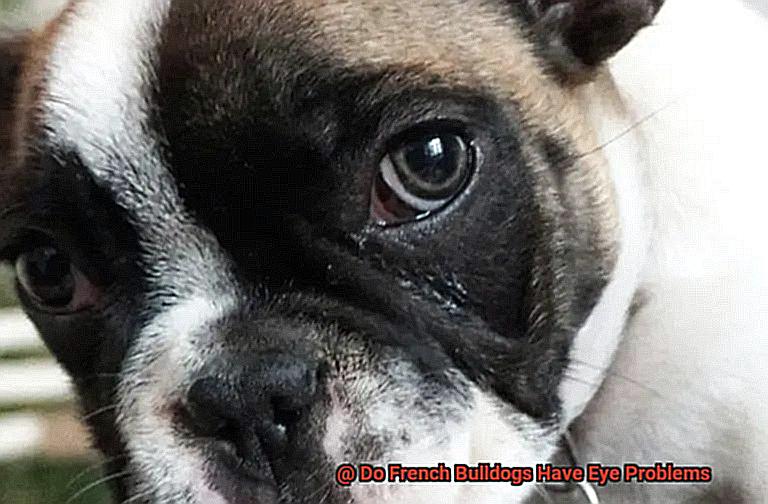
Corneal Ulcers:
French Bulldogs are susceptible to developing corneal ulcers, which are open sores on the surface of the eye. These ulcers can be caused by trauma, foreign objects, or underlying conditions like dry eye. Keeping a close eye on your Frenchie’s eyes and seeking prompt veterinary attention can prevent further complications.
Entropion:
Imagine your Frenchie’s eyelid rolling inward, causing their eyelashes to rub against their delicate eyes. This is known as entropion, a condition that can lead to irritation, inflammation, and potential corneal damage if not addressed promptly. Regular check-ups with a veterinarian can help identify and address this issue early on.
Progressive Retinal Atrophy (PRA):
Progressive retinal atrophy is a genetic disorder that affects the retina and can lead to vision loss or even blindness in French Bulldogs. While there is no cure for PRA, early detection and management can help slow down its progression. Regular visits to an ophthalmologist are crucial for monitoring your Frenchie’s eye health.
What Is Cherry Eye in French Bulldogs?
French Bulldogs, those lovable little bundles of joy with their cute smooshed faces and big, round eyes, are prone to a condition called cherry eye. Now, you might be wondering, what on earth is cherry eye? Well, don’t worry, I’m here to break it down for you.
Cherry eye is a common eye problem that can affect French Bulldogs, and it’s characterized by the prolapse or protrusion of the third eyelid gland. This gland is located in the inner corner of the eye and is responsible for producing tears to keep the eye lubricated and healthy. When this gland becomes inflamed and pops out of its normal position, it looks just like a cherry – hence the name.
This pesky condition can occur in one or both eyes and is more commonly seen in younger French Bulldogs, typically under the age of two. While the exact cause of cherry eye is not fully understood, experts believe that a weakness in the connective tissue that holds the gland in place may play a role. Factors such as genetics and immune system abnormalities could also contribute to its development.
So, how can you tell if your French Bulldog has cherry eye? Look out for symptoms such as a red or swollen mass in the inner corner of the eye, excessive tearing, squinting, and discomfort. If left untreated, cherry eye can lead to further complications like dry eye and corneal ulcers – yikes.
Now, let’s talk about treatment options. When it comes to cherry eye, surgery is often recommended. During the procedure, a veterinarian will reposition or remove the affected gland to alleviate discomfort and prevent long-term complications. It’s important to follow post-operative care instructions provided by your vet to ensure proper healing and prevent recurrence.
Remember, prevention is always better than cure. While you can’t completely eliminate the risk of cherry eye in your French Bulldog, there are a few things you can do to reduce the chances. Regular vet check-ups, maintaining good eye hygiene, and avoiding unnecessary eye trauma can go a long way in keeping your furry friend’s eyes healthy and cherry eye-free.
How Is Entropion Treated in French Bulldogs?
One common issue is entropion, where the eyelid rolls inward, causing discomfort and potential eye damage. But fear not. In this article, we’ll explore how entropion is treated in French Bulldogs, providing you with expert advice to ensure your furry friend’s well-being.
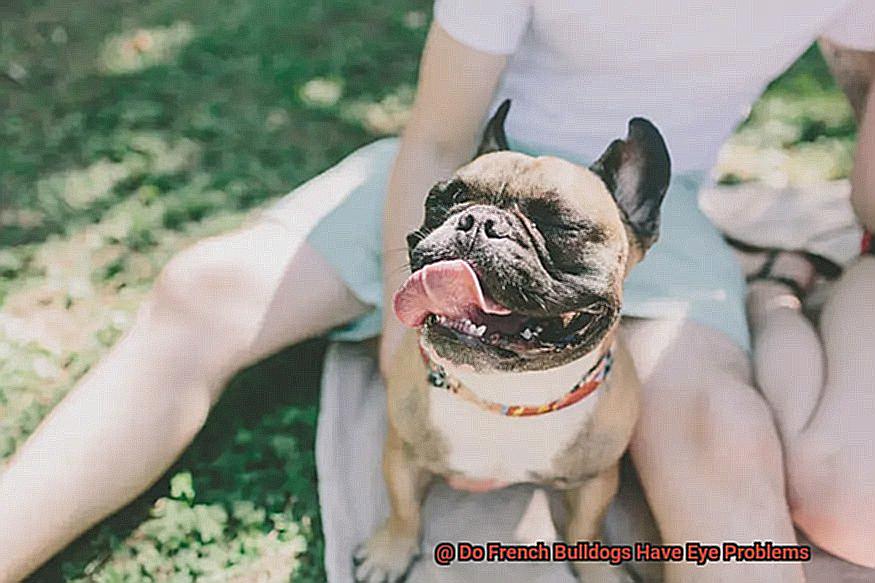
Surgical Treatment Options:
When it comes to treating entropion, surgery is often the go-to solution. Here are two common techniques used by veterinarians:
- a) Eyelid Tacking: This procedure involves placing sutures in the eyelid to temporarily correct its position. It’s especially beneficial for puppies with mild or moderate entropion, as their facial structure is still developing. The sutures are typically removed after a few weeks once the eyelid has healed properly.
- b) Blepharoplasty: For more severe cases of entropion, blepharoplasty may be necessary. This surgical technique involves removing a small section of skin from the affected eyelid to correct its position. The incision is made along natural creases to minimize scarring.
Addressing Underlying Causes:
To ensure a successful treatment outcome, it’s essential to address any underlying factors contributing to entropion:
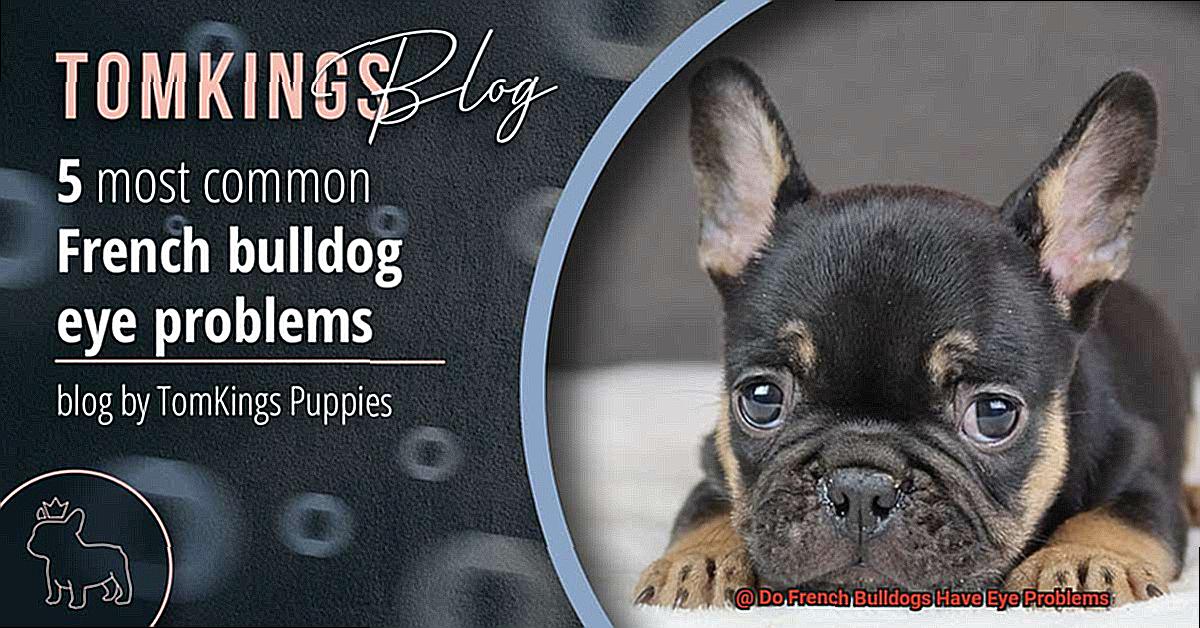
- Eye Infections and Allergies: If your French Bulldog has an existing eye infection or allergies, these need to be treated promptly. Your veterinarian may prescribe medication to alleviate symptoms and prevent further irritation.
- Good Eye Hygiene: Keeping your Frenchie’s eyes clean and free from debris can help prevent additional irritation. Use a vet-approved eye wash or saline solution to gently cleanse their eyes as part of your regular grooming routine.
Post-Surgery Care:
After surgery, follow these crucial steps to ensure a smooth recovery for your French Bulldog:
- Medication Adherence: Administer any prescribed medications, such as antibiotics or anti-inflammatory drugs, as directed by your veterinarian. This will aid in pain relief and prevent infection.
- Topical Ointments: Applying vet-recommended ointments to the surgical site can promote healing and minimize scarring. Be sure to follow the instructions provided.
- Follow-up Appointments: Regular follow-up visits with your veterinarian are essential to monitor the healing process and address any concerns. They will guide you on when it’s safe to resume normal activities.
What Causes Dry Eye in French Bulldogs?
If you’ve ever noticed your furry friend rubbing their eyes, squinting, or showing signs of discomfort, they might be suffering from dry eye. But what causes this pesky condition in our adorable Frenchies? Let’s dive into the fascinating world of dry eye in French Bulldogs.
The Genetic Factor:
French Bulldogs are undeniably charming, but they also come with a genetic predisposition to certain conditions. One such condition is immune-mediated adenitis (IMA), which affects the tear-producing glands in their eyes. This increases their risk of developing dry eye.
Environmental Troublemakers:
Just like us, our Frenchies can be sensitive to their surroundings. Dust, pollen, smoke, and dry air are all potential culprits that can trigger dry eye in these delightful pups. So, keep those windows closed during allergy season.
Medications:
Watch out for sneaky medications that can mess with your Frenchie’s tear production. Some immune-suppressing drugs, antibiotics, antihistamines, and even pain medications can contribute to the development of dry eye. Always consult your veterinarian about potential side effects.
Age Is Just a Number… for Tear Production:
As our furry companions age gracefully, changes occur in their tear production. Tear glands become less efficient over time, resulting in decreased tear volume and quality. This makes older French Bulldogs more susceptible to dry eye. They deserve extra love and attention during their golden years.
Eyelid Hijinks:
French Bulldogs are known for their expressive eyes, but certain eyelid abnormalities can lead to trouble. Entropion (inward rolling of the eyelids) or ectropion (outward turning of the eyelids) can disrupt the normal distribution of tears across the eye’s surface, causing dryness and irritation.
Unwanted Health Conditions:
Dry eye can also be a warning sign of other underlying health issues in French Bulldogs. Autoimmune diseases like hypothyroidism and diabetes mellitus can affect tear production, making our furry friends more prone to dry eye. Let’s keep an eye out for these conditions.
Now you know why our lovable French Bulldogs are susceptible to dry eye. Remember, if you notice any signs of dryness or discomfort in your Frenchie’s eyes, don’t hesitate to seek veterinary advice. Early detection and appropriate treatment can alleviate their discomfort and keep those adorable eyes sparkling. Stay vigilant and give your furry friends the love and care they deserve.
Symptoms of Corneal Ulcers in French Bulldogs
French Bulldogs are known for their expressive eyes and adorable wrinkles, but these precious features can also make them prone to certain eye conditions, including corneal ulcers. If you’re a proud Frenchie parent, it’s crucial to be aware of the symptoms of corneal ulcers so you can take swift action and ensure your furry companion receives the care they need.
- Redness and Inflammation: Keep a close eye on your Frenchie’s peepers. If you notice redness or inflammation around the eye area, it could be a sign of a corneal ulcer. The affected eye may appear bloodshot, and you might even notice some swelling. Poor little pups.
- Squinting and Eye Closure: Just like humans, dogs blink to keep their eyes moist and protected. But when a corneal ulcer is present, blinking can be painful. So, if you see your French Bulldog squinting or keeping their affected eye closed, it’s time to investigate further.
- Excessive Tearing or Discharge: If your Frenchie’s eye is watering more than usual or if you notice any unusual discharge, don’t ignore it. The increased tear production is the body’s way of trying to soothe the irritation caused by the ulcer. The discharge may be clear and watery or thick and mucous-like if an infection has developed. Yuck.
- Sensitivity to Light: Bright lights can become a nightmare for French Bulldogs with corneal ulcers. They may avoid sunlight or other sources of bright light altogether, trying to shield their delicate eyes from further discomfort. Poor pups definitely deserve some shades.
- Cloudy Appearance: In some cases, a corneal ulcer can cause a visible opacity or cloudiness on the surface of the eye. This is due to inflammation and scarring that can occur as a result of the ulcer. The cloudiness may affect vision and can range from mild to severe. Just like when we get something in our eye, it’s not pleasant for our furry friends either.
Remember, these symptoms are not exclusive to corneal ulcers and can also be seen in other eye conditions. It’s crucial to consult a veterinarian for a proper diagnosis if you observe any of these symptoms in your French Bulldog. A professional opinion is essential for accurate diagnosis and appropriate treatment to prevent further complications and promote healing.
Treatment Options for Corneal Ulcers in French Bulldogs
Corneal ulcers are a common eye problem in French Bulldogs. These ulcers occur when the clear outer layer of the eye, known as the cornea, becomes damaged or scratched. If left untreated, corneal ulcers can lead to discomfort, redness, excessive tearing, and even vision loss. Thankfully, there are several treatment options available to help your furry friend recover from this condition.
- Medications: Topical medications are often the first line of defense when it comes to treating corneal ulcers in French Bulldogs. Antibiotic eye drops or ointments are commonly prescribed to prevent infection and promote healing. These medications help fight off any bacteria that may have entered the damaged cornea and reduce the risk of further complications.
- Protective Eyewear: To aid in the healing process and prevent further damage, your veterinarian may recommend using protective eyewear for your French Bulldog. Goggles or special contact lenses can provide a barrier between the eye and potential irritants or trauma. This can be particularly helpful if your Frenchie loves exploring the outdoors or has a habit of rubbing their eyes.
- Surgical Intervention: In more severe cases, surgical intervention may be necessary. Procedures such as corneal debridement involve removing damaged tissue from the cornea to promote healing. Corneal grafting, on the other hand, involves transplanting healthy tissue onto the ulcerated area. Your veterinarian will determine if surgery is needed based on the severity and underlying cause of the corneal ulcer.
- Pain Management: Corneal ulcers can be quite painful for your French Bulldog. Your veterinarian may prescribe pain medication to help alleviate discomfort during the healing process. It’s important to monitor your Frenchie closely and administer any prescribed medication as directed.
- Management of Underlying Conditions: Sometimes, corneal ulcers can be a result of underlying conditions such as dry eye or entropion. Treating these conditions will be crucial in preventing future ulcers from developing. Your veterinarian will work with you to address any underlying issues and develop a management plan that suits your Frenchie’s needs.
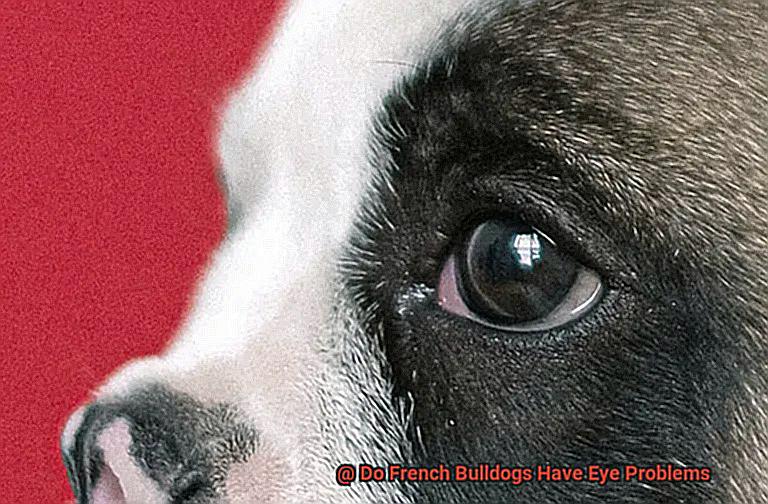
Remember, it’s essential to consult with a veterinarian if you suspect your French Bulldog has a corneal ulcer. They will be able to accurately diagnose the condition and recommend the most appropriate treatment plan. Prompt treatment is vital to prevent complications and ensure a speedy recovery for your furry friend.
Tips for Monitoring Your French Bulldog’s Eyes
French Bulldogs are adorable and lovable companions, known for their expressive eyes. However, their unique physical traits also make them prone to certain eye problems. Regularly monitoring your French Bulldog’s eyes is crucial to catch any potential issues early on and ensure their ocular health. Let’s dive into some helpful tips that will keep your furry friend’s eyes sparkling and healthy.
The Importance of Regular Eye Examinations:
Just like humans, our furry friends need regular check-ups with a veterinarian who specializes in ophthalmology. These professionals can detect early signs of eye problems and provide appropriate treatment or preventive measures.
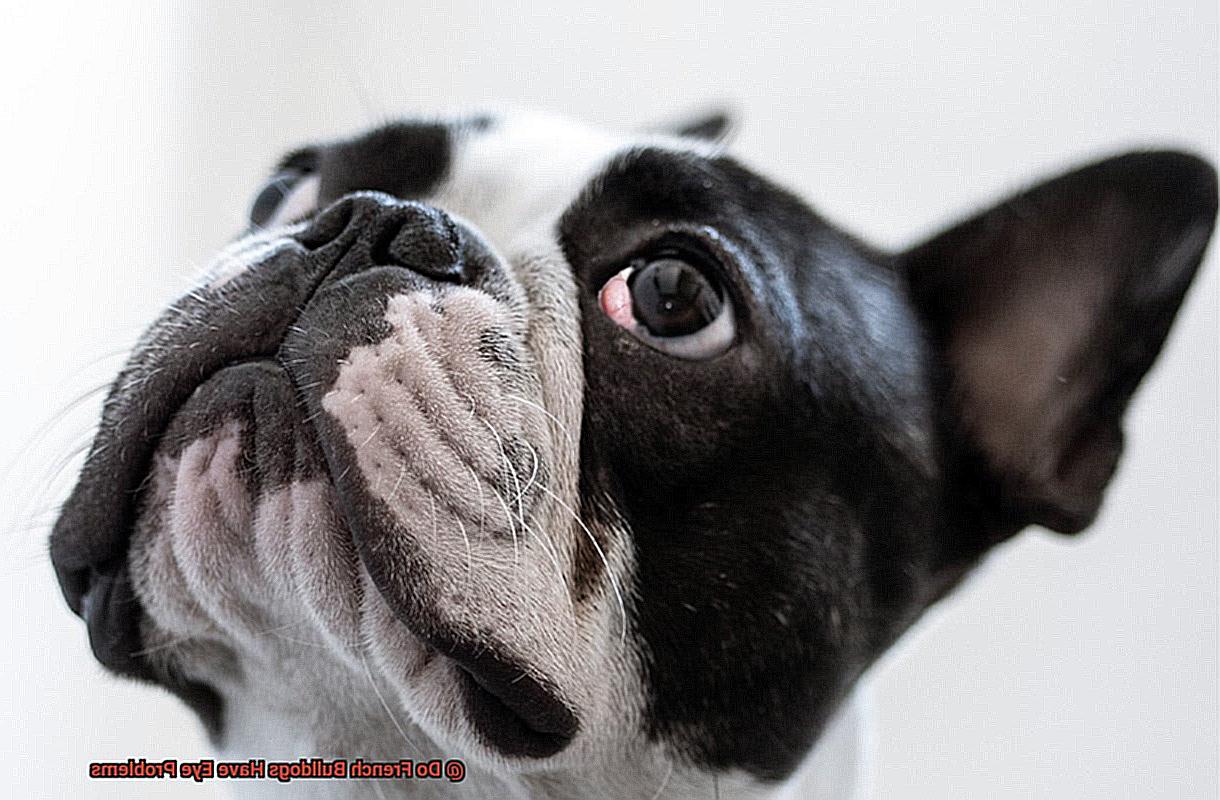
Observing Unusual Symptoms:
As responsible owners, it’s essential to closely observe your French Bulldog’s eyes for any unusual symptoms such as redness, swelling, discharge, excessive tearing, squinting, cloudiness, or changes in the size or shape of the pupils. These symptoms could be indicators of underlying eye issues.
Maintaining Cleanliness:
Proper hygiene around your French Bulldog’s eyes is crucial. Gently wipe away any dirt, debris, or tear stains using a clean and damp cloth. Avoid excessive touching or rubbing of the eyes to prevent irritation or injury.
Protecting from Irritants:
French Bulldogs have sensitive eyes that can be easily irritated by dust, pollen, smoke, chemicals, or other environmental irritants. Limit their exposure to these substances if you notice redness or irritation after contact.
Sun Protection:
Just like humans, French Bulldogs can suffer from sunburn and eye damage due to prolonged exposure to sunlight. Provide shade when necessary or consider using dog-friendly sunglasses during peak hours of sunlight.
Brachycephalic Syndrome:
French Bulldogs have a unique facial structure called brachycephalic syndrome, which can lead to various health issues, including eye problems. Watch for symptoms such as breathing difficulties, excessive snoring, or eye protrusion.
How to Find a Veterinary Ophthalmologist for Your French Bulldog
French Bulldogs are beloved pets known for their adorable appearance and unique eye shape. However, this breed is prone to specific eye conditions that require expert care. In this guide, we will explore how to find a qualified and experienced veterinary ophthalmologist who can provide the best treatment for your French Bulldog’s eyes.
Seek Recommendations:
Start by asking your regular veterinarian or other French Bulldog owners who have dealt with eye problems in their dogs. They can provide valuable insights and recommend reputable veterinary ophthalmologists.
Explore Online Directories:
Research online directories or databases that list veterinary ophthalmologists in your area. These resources offer details about the veterinarian’s credentials, experience, and contact information. Ensure that the veterinary ophthalmologist you choose is board-certified by the American College of Veterinary Ophthalmologists (ACVO) to guarantee excellence in their field.
Consider Expertise:
During your initial consultation, ask questions about the veterinary ophthalmologist’s experience with French Bulldogs specifically. This breed has unique eye anatomy, so finding a professional familiar with their specific needs is crucial. Inquire about their diagnostic tools and available treatment options to ensure they stay up-to-date with the latest techniques.
Location and Accessibility:
Consider the location and accessibility of the veterinary ophthalmologist’s clinic. Having a professional within a reasonable distance is important for emergencies or follow-up visits. Ensure their availability aligns with your schedule.
Observe Communication Skills:
Pay attention to how the veterinary ophthalmologist communicates and interacts with your French Bulldog during your initial visit. You want someone who makes you feel comfortable and confident in their abilities to care for your pet’s eyes.
Conclusion
French Bulldogs are undeniably adorable and beloved pets.
However, it is important to be aware of the potential eye problems that they may face. These charming little dogs are prone to a variety of ocular issues, including cherry eye, dry eye, and corneal ulcers.
Cherry eye occurs when the gland in the third eyelid becomes inflamed and protrudes from the corner of the eye, resembling a small red cherry. Dry eye, also known as keratoconjunctivitis sicca, is a condition where the eyes do not produce enough tears to keep them moist and lubricated.
This can lead to discomfort, redness, and even vision impairment if left untreated. Corneal ulcers are another concern for French Bulldogs, as their prominent eyes are more susceptible to scratches or injuries that can result in painful ulcers on the cornea.
Therefore, it is crucial for French Bulldog owners to be vigilant about their pet’s eye health and seek regular check-ups with a veterinarian who specializes in ophthalmology.
